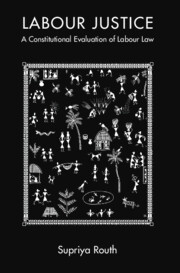Book contents
- Frontmatter
- Dedication
- Contents
- Preface
- Acknowledgements
- Introduction: The Law of Labour—Evaluating the Labour Law Reforms
- 1 Labour’s Constitution: Pursuing Economic, Social and Political Justice
- 2 Individual Autonomy, Freedom of Contract and the Labour Market
- 3 Solidarity and Social Welfar
- 4 Industrial Democracy and Republican Citizenship: Collective Action in Resource Redistribution
- Conclusion: Realising Labour Justice
- Bibliography
- Index
Introduction: The Law of Labour—Evaluating the Labour Law Reforms
Published online by Cambridge University Press: 30 April 2024
- Frontmatter
- Dedication
- Contents
- Preface
- Acknowledgements
- Introduction: The Law of Labour—Evaluating the Labour Law Reforms
- 1 Labour’s Constitution: Pursuing Economic, Social and Political Justice
- 2 Individual Autonomy, Freedom of Contract and the Labour Market
- 3 Solidarity and Social Welfar
- 4 Industrial Democracy and Republican Citizenship: Collective Action in Resource Redistribution
- Conclusion: Realising Labour Justice
- Bibliography
- Index
Summary
Introduction
This book argues that the 2020 labour law reforms in India, where Parliament consolidated twenty-nine federal statutes into four labour codes, fail to meet the Indian Constitution's labour mandate. In so failing to meet the constitutional mandate, the reforms have far-reaching consequences for labour rights in the country. Labour, understood broadly as an individual's personal undertaking contributing to broader socio-economic pursuits, occupies a prominent position in the constitutional framework in India. As a category, labour is pivotal to the social justice agenda envisaged under the Constitution. The Preamble to the Constitution of India, 1950, aspires to social, economic and political justice. The other values fundamental to the foundation of the republic are freedom, equality and solidarity. While the latter values are inherently important for the constitutional framework of the nation, they are also the conceptual and programmatic components of the constitutional social justice agenda.
On the basis of its social justice agenda, India's Constitution could be positioned somewhere between classical liberalism and social democracy. In classical liberalism, on the one hand, the constitution stipulates basic rules of contract, property and tort to regulate market exchanges, which are the primary means of distributing goods and services. In social democracy, on the other hand, the constitution catalogues extensive rules of redistribution that secure citizens’ legal entitlements, such as education, nutrition, work, healthcare, social security, unionisation, maternity benefit, legal aid, and so on. Mark Tushnet notes that in classical liberalism, the distribution of goods and the principles of such distribution are primarily the concern of private law, whereas in social democracy, they are primarily a public law issue. The Indian Constitution uses – balances – both of these approaches by simultaneously allocating a role for the market (structured through private law) and guaranteeing welfare rights (secured through public law).
The Constitutional Social Justice Agenda
The Indian Constitution's social justice agenda is furthered through a combination of individual freedom, social solidarity and participatory democracy. It is the balance among these three aspects of the social justice agenda that captures the uniqueness of the agenda for Indian society. The Constitution guarantees every citizen of India the individual freedom to practise their chosen occupation and engage in a trade or business of their choice without undue interference.
- Type
- Chapter
- Information
- Labour JusticeA Constitutional Evaluation of Labour Law, pp. 1 - 28Publisher: Cambridge University PressPrint publication year: 2024

